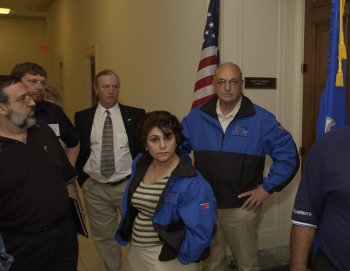Return to Contents Page |
Your Government is For Sale!
“My party's in power, and it's going to undertake a lot of public improvement. Well, I'm tipped off, say, that they are going to lay out a new park at a certain place. I see my opportunity and I take it. I go to that place and buy up all the land I can in the neighborhood. Then the board for this or that makes its plan public, and there is a rush to get my land, which nobody cared particular for before. “Ain't it perfectly honest to charge a good price and make a profit on my investment and foresight? Of course, it is. Well, that's honest graft.”
George Washington Plunkitt
“My party’s in power . . .(and) I’m tipped off,” the ward boss brags, and you can almost hear the horse-drawn carts clop-clop-clopping down the streets of Manhattan. Today’s politicians would never discuss the corrupting influence of money so honestly. If they did, they would tell you of oceans of cash rolling through the door: of riches offered for the taking, greater than Plunkitt’s greediest dreams. Skim funds from a park project? That’s petty stuff, Mr. Plunkitt! Today’s politicians have taken the game way beyond skimming funds or buying a few votes. Today, money decides who gets into government in the first place: who runs and who gets elected. Money decides who writes the laws, and what laws get written, enacted or repealed. Money decides whose voices the politicians hear and—equally important—whose voices are excluded from the public debate, to be ridiculed and ignored. Money dominates U.S. politics so completely it has effectively turned our democracy into a plutocracy: a ‘government by the wealthy, for the wealthy.’ We have today, quite literally, the best government money can buy.
Democracy, or Plutocracy? Meanwhile, federal elected officials will receive $480 million from individual political donors (mainly conservative members of the financial elite) this year and political action committees, or PACs, will kick in another $82.5 million. At least $309 million more in so-called “soft” (or unregulated) money will pour in through a bewildering assortment of channels, from direct donations to political parties (instead of to candidates) to the airing of “issue ads” that often carry a clear partisan message but stop just short of endorsing or opposing a particular candidate. Add it all up and more than $2.4 billion is spent each year to influence our national government. That’s more than 60 percent of the nations on earth spend each year to operate their governments, according to CIA’s World Factbook.
It cost an average $7.7 million to win a Senate seat in the last election and $842,245 to win a seat in the House — roughly three times the cost of simply running for Congress. Even these averages seriously understate the true price of political power. Why? Because many winning races are virtual no contests — “safe seats” in heavily Democratic or Republican states and districts where there is little need for expensive campaigns. The Real Big Money is saved for a handful of key, “toss up” races where the outcome will help determine party control over Congress or the White House. For example, the Clinton/Lazio Senatorial Smackdown in New York last election cost the candidates a combined $82 million ($41.5 million for her, $40.6 million for him) — more than 30 times the cost of an average Senate race. The costliest House race in history burned through $11.6 million last election — nearly 40 times the average — as Democrat Adam Schiff and Republican James Rogan battled for victory in California’s 27th District. And these figures only count political contributions regulated by the FEC (so-called “hard money”). For every hard dollar, another 40-to-60 cents in “soft money” is typically spent on issue ads, voter education and other partisan political activities that are carefully designed to skirt FEC regulations and reporting requirements.
How to
Buy A Politician Cooper loves thumbing through thick stacks of documents and crunching columns full of numbers. “Find the human side of the numbers,” he advises. “The numbers help you focus on the connections between elected officials, people and issues. They make the picture clearer and brighter.” Yet the picture Cooper sees is not a pretty one. “There is a much closer relationship between money given and the individual members of Congress than is typically understood or generally reported,” Cooper explains. “The money is often solicited by members of Congress who have targeted various industries for donations — industries that they are regulating. The companies find it hard to say ‘No’ to the chairman of a committee with jurisdiction over their industry. And very often, the regulated industries offer the money. That’s how the money is raised.” Powerful forces — personal and political — keep the money machine rolling, Cooper continues. “Imagine you were just elected and you arrive in Washington not just broke, but deep, deep in debt — $200,000 or $300,000. You’ve re-mortgaged your house and borrowed from your family and friends. You left your family behind, or maybe you brought them along, so the kids have to change schools and say good-bye to all their friends, and the wife has to quit her job and leave her friends. Either way, the home front is not a happy scene. So here you are, exhausted, stressed out and broke. And who is the first person you see? A lobbyist waving a big fat check . . . You are always going to remember that lobbyist who was there in your hour of deepest need. That’s how this system makes elected officials so very vulnerable,” he explains.
“A congressman or senator spends more time each day raising money than legislating. That’s not unusual. How much time does that leave to study legislation or meet your constituents? And when you do have time you have to choose. How much time do you spend with Joe Blow from your district, and how much do you spend with the person who raised $10,000 or $50,000 for you last election?” Nonetheless, Cooper sounds wistful — not jaded or cynical — when he talks about the impact of Big Money on the democratic process. “I see the bus loads of people roll into Washington — full of union members, say, who have driven 12 or 14 hours through the night to see their legislators. And they climb out of the bus and start walking the corridors, going from office to office . . . Meanwhile, there’s a lobbyist walking through the back door ... He has raised money for these people. He knows exactly who to see at exactly the right time to affect the process. The Congress members recognize him and they stop to talk with him. That’s how the principle of one man-one vote gets diluted,” he explains.
Union
Votes Can Trump Big Dollars “Workers — not the rich — make up the vast majority of people in this country. If we register to vote, and register our neighbors and families and show up at the polls, we win. It really is that simple. We have the numbers and we can control the country,” Buffenbarger says. “The 2000 presidential race came down to 537 votes in Florida — a state with 227,320 unregistered union voters. Every vote counts! “The next big election is this fall. IAM members need to make a big push on voter registration. And we need to push hard for more donations to our PAC, the Machinists Nonpartisan Political League. Like it or not, it takes money to make an impact in national politics,” Buffenbarger stresses. “But our strength will always rest with politically aware working people who vote. We are the majority. We can take our country back from big money — if we want it bad enough to organize and fight for it,” says Buffenbarger.
|

